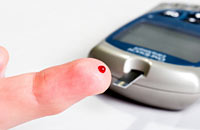Electronic Medical Records
The Privacy vs. Accessibility Debate
Another controversial aspect of computerizing medical records is the issue of whether privacy concerns are at stake by putting patients’ medical records in an online database, and whether this threat outweighs the benefits of information sharing.

Having access to databases with these medical records may facilitate research as the data can be used anonymously for statistical information. Physicians can use the data from thousands of individuals with the same diseases as their patients to improve their treatment methods. Access to information on, for example, the blood glucose, cholesterol and blood pressure levels of diabetes patients could show doctors which treatments yield the optimal results.
For the full article on the impact of EMRs on diabetes treatment, see:
http://care.diabetesjournals.org/content/26/3/942.full
The public supports this claim. According to a poll posted on Wall Street Journal Online in 2007, three-quarters of respondents agree that patients could receive better care if doctors and researchers were able to share information more easily via electronic systems.
For more on this topic, see the Wall Street Journal 2007 article, "Benefits of Electronic Medical Records Seen as Outweighing Privacy Risks":
http://hfs.illinois.gov/assets/ilhie_112907.pdf
* * * * *
Anti-EMR: EMRs threaten patients’ privacy
1. Computerizing medical records makes them more vulnerable to theft.
USA Today published the results of a Privacy Rights Clearinghouse survey which found that over 45 million electronic health records were either lost, stolen by insiders such as hospital or government employees, or hacked.
This is dangerous because patients’ records might be accessible to private companies that could sell them to other companies, especially pharmaceutical or insurance companies. The fear here is that the insurer will then have access to private medical records and may use the data against the patient by limiting his benefits or ending his coverage.
In 2009, National Public Radio, the Kaiser Family Foundation and the Harvard School of Public Health conducted a poll to ask if people felt that their medical records would remain confidential if they were stored electronically and could be shared online. Fifty nine percent responded that they were not confident.
For more information on this issue, see the USA Today article here: http://www.usatoday.com/news/health/2008-06-11-online-medical-records_N.htm
For the full article on the impact of EMRs on diabetes treatment, see:
http://care.diabetesjournals.org/content/26/3/942.full
The public supports this claim. According to a poll posted on Wall Street Journal Online in 2007, three-quarters of respondents agree that patients could receive better care if doctors and researchers were able to share information more easily via electronic systems.
For more on this topic, see the Wall Street Journal 2007 article, "Benefits of Electronic Medical Records Seen as Outweighing Privacy Risks":
http://hfs.illinois.gov/assets/ilhie_112907.pdf
* * * * *
Anti-EMR: EMRs threaten patients’ privacy
1. Computerizing medical records makes them more vulnerable to theft.
USA Today published the results of a Privacy Rights Clearinghouse survey which found that over 45 million electronic health records were either lost, stolen by insiders such as hospital or government employees, or hacked.
This is dangerous because patients’ records might be accessible to private companies that could sell them to other companies, especially pharmaceutical or insurance companies. The fear here is that the insurer will then have access to private medical records and may use the data against the patient by limiting his benefits or ending his coverage.
In 2009, National Public Radio, the Kaiser Family Foundation and the Harvard School of Public Health conducted a poll to ask if people felt that their medical records would remain confidential if they were stored electronically and could be shared online. Fifty nine percent responded that they were not confident.
For more information on this issue, see the USA Today article here: http://www.usatoday.com/news/health/2008-06-11-online-medical-records_N.htm

2. This fear that confidentiality might be breached leads patients to withhold information.
Deborah Peel (Patient Privacy Rights) and Tim Sparapani (ACLU), privacy rights advocates, both argue that the fear that records are not secure will cause to patients withhold important information from their physicians, especially regarding sexually transmitted diseases, drinking problems, or cancer.
In 2005, a poll conducted by the California Healthcare Foundation found that one in eight Americans avoided seeing a regular doctor, asked their physicians to change a diagnosis, paid privately for a test, or refused to avoided tests due to privacy concerns.
To view the results of this poll, see:
http://online.wsj.com/article/ SB10001424052748703580904575132111888664060.html
* * * * *
The top picture on this page is from:
http://www.summerlinhospital.com/img.php?RevisionID=15654&Filename=diabetes.jpg
The bottom picture is from:
http://3.bp.blogspot.com/_fDL20zbkg6c/R8hdRfrHOrI/AAAAAAAAAw8/EHhGth9ABHQ/s320/shhhh-724395.png
Deborah Peel (Patient Privacy Rights) and Tim Sparapani (ACLU), privacy rights advocates, both argue that the fear that records are not secure will cause to patients withhold important information from their physicians, especially regarding sexually transmitted diseases, drinking problems, or cancer.
In 2005, a poll conducted by the California Healthcare Foundation found that one in eight Americans avoided seeing a regular doctor, asked their physicians to change a diagnosis, paid privately for a test, or refused to avoided tests due to privacy concerns.
To view the results of this poll, see:
http://online.wsj.com/article/ SB10001424052748703580904575132111888664060.html
* * * * *
The top picture on this page is from:
http://www.summerlinhospital.com/img.php?RevisionID=15654&Filename=diabetes.jpg
The bottom picture is from:
http://3.bp.blogspot.com/_fDL20zbkg6c/R8hdRfrHOrI/AAAAAAAAAw8/EHhGth9ABHQ/s320/shhhh-724395.png
